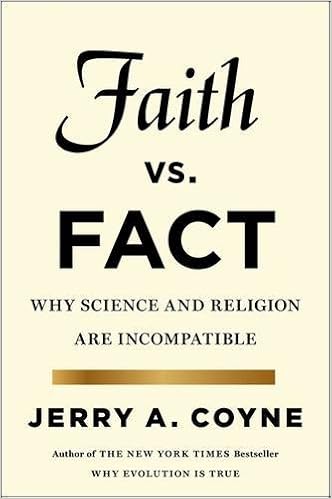 It’s no surprise that Coyne’s book is getting hostile reviews outside the new atheist community. Closing off our religion coverage for the week, we note that prominent Darwinian evolutionist Jerry Coyne’s Faith Versus Fact: Why Science and Religion Are Incompatible is, unsurprisingly, receiving hostile reviews outside the new atheist community. But what’s curious is their focus.
It’s no surprise that Coyne’s book is getting hostile reviews outside the new atheist community. Closing off our religion coverage for the week, we note that prominent Darwinian evolutionist Jerry Coyne’s Faith Versus Fact: Why Science and Religion Are Incompatible is, unsurprisingly, receiving hostile reviews outside the new atheist community. But what’s curious is their focus.
From Austin L. Hughes at New Atlantis:
Coyne’s basic strategy is to contrast two monolithic entities that he calls “religion” and “science.” But he constructs his two monoliths in diametrically opposite ways. The “religion” monolith consists of everything that has ever been said by any person belonging to any religion whatever, lumping together official dogma, theological speculation, and popular belief…
Coyne’s procedure for describing “science” is very different; his “science” monolith represents only the very best of science, only those theories that are strongly supported by evidence and have withstood the rigors of numerous attempts at empirical falsification… Even apart from cases of outright fabrication, the mainstream scientific literature is full of false inferences and of theories so untestable that they fully merit designation as “pseudoscience.”
I know by painful experience that a continual admixture of junk with solid science is characteristic of my own field (which, like Coyne’s, is evolutionary biology). … We all know of ridiculous theories (Social Darwinism, eugenics, Marxism, Freudianism, Lysenkoism, and so forth) that in the not-too-distant past claimed for themselves the mantle of science, and it would be naïve to assume that the same thing can never happen again. Much of so-called “evolutionary psychology” (hailed by Coyne as a promising new development) is every bit as pseudoscientific as its Social Darwinist precursors; indeed one would be hard pressed to find a reason for saying that much of it is any more “fact-based” than the ideas of Mary Baker Eddy. More.
But isn’t Coyne really just contrasting new atheism with all other faiths, relying on the fact that anyone can call anything they want to a “science”?
From Edward Feser at First Things:
The book flies off the rails before it reaches page one. In an unintentionally comic passage in his preface, Coyne explains what he has in mind by “religion.” First, he tells us that his main target isn’t religions that emphasize practice, such as “the more meditation-oriented versions of Buddhism.” Rather, it is religions that emphasize controversial truth claims about the world—in particular, “theistic faiths,” those that affirm the existence of a God or gods. But even more specifically, he says, he will “concentrate on the Abrahamic faiths: Islam, Christianity, and Judaism.” Two sentences later we learn that in fact it is “mostly the various brands of Christianity that occupy this book.” But far from all the brands, since in the very next sentence he adds that, actually, he “will talk mostly about science and religion in the United States.”
By the following page he qualifies this even further, indicating that the views of “regular believers” interest him more than do the fancy arguments of theologians. Next it is conceded that it is “only a few specific areas of science,” such as Darwinism, that are rejected by religious believers. Yet, as Coyne admits, even “evolution . . . is accepted by many Jews, Buddhists, Christians, and liberal Muslims.” In short, when all the qualifications are in, it seems that Coyne’s paradigm of “religion” is Bible Belt creationism. Apparently, he was absent the day his college statistics class covered the notion of a representative sample. More.
Darwinism is a good basis for the storytelling habit of mind. The Darwinist knows what story he wants to tell, and facts must just be cut and pasted to fit.
But more generally, as Tim Whitmarsh points out in the recent book Battling the Gods, atheism is not some brand new “science-based” enlightenment; it has always been one response to the ultimate questions. Coyne’s premise, in the end, is a forgettable one, of the sort that passes for deep thought in the age of pop Darwin.
See also: Atheism is natural to humans The book, Battling the Gods, sounds like a timely challenge to pop science “religion is hardwired” news.
Faith vs. Fact: Jerry Coyne’s flawed epistemology (Vincent Torley)
and
Science writer scorches Jerry Coyne, doesn’t worship him
Follow UD News at Twitter!